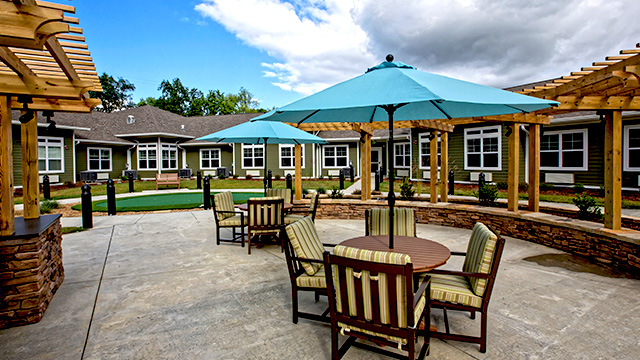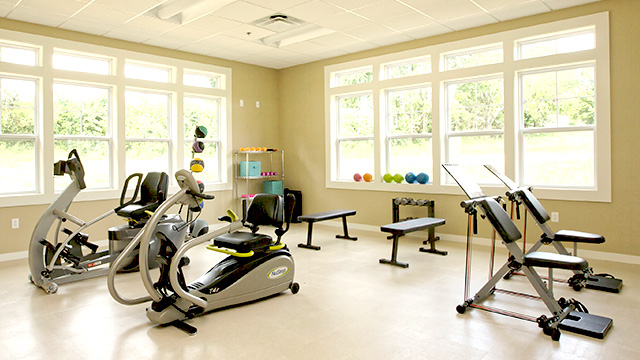
Additional resources are just a click away.
Oakmont at Gordon Park welcomes and encourages the active participation of adult children, loved ones or other caregivers in the process of choosing Oakmont and throughout the life of the resident in the community.
Following, we’ve addressed a number of questions that frequently arise when discussing a senior living community like Oakmont at Gordon Park. As you learn more about the community – or your retirement information search in general- other questions may arise. Give us a call. We invite you to call for a personal tour or for additional information.
If you’re comfortable, it can be very enlightening to have a frank but loving conversation with your parent about their feelings and concerns with aging. (It’s quite possible that they’ve been considering how to start a conversation with you about their potential move.)
Many people will begin the process of seeking an appropriate retirement community – touring various communities and talking with staff on behalf of their aging loved one – to discover the options and opportunities available. Then, being prepared in this way, drawing draw their parent into the conversation.
You may be in a good position to observe and monitor subtle changes such as these in your loved one. It’s also a good idea to talk with your father’s doctor and share your concerns.
- With stage one, there is no impairment. There is no significant memory problem, judgment is normal, and your loved one is fully able to care for their personal needs.
- Stage two is characterized by slight impairments, such as memory inconsistencies and struggles with timing or solving problems. They can still manage personal care without any help.
- Stage three is a noticeable but mild impairment in areas such as short-term memory, disorientation and getting around. Chores may begin to be neglected. Reminders are needed for such things as personal hygiene.
- A person with stage four has a moderate impairment. Though well enough to go out, they need to be accompanied for social activities and chores.
- Stage five is severe impairment – the inability to function without help. Stage 5 is characterized by extreme memory loss, confusion and lack of orientation. At this stage, everyday functions are almost impossible, even with assistance.

Helping you understand the language of senior living.
Assisting your parents or loved ones as they explore retirement community options often requires a little translation. You’ll notice some terms pop up frequently. Hopefully this brief glossary will help you differentiate plans, services and senior living options.
Age-restricted
Most retirement communities require that residents have reached a given age before moving in. You’ll find 65+ is a common benchmark.
Assisted Living
Assisted living communities typically provide services which allow the resident to maintain a degree of independence, while offering a helping hand with given tasks such as bathing, grooming, dressing and taking medications.
Independent Living
In an independent living (or residential living) community, residents are capable of living in a residence with or without assistance.
Long-term Care Insurance
Long-term care insurance is a type of insurance developed specifically to cover the cost of skilled nursing, assisted living, home health care and other long-term care services. These services are usually not covered by traditional health insurance or Medicare.
Medicare
The federal health insurance program called Medicare is designed for people who are 65 and older, certain younger people with disabilities, and people with End-Stage Renal Disease. Medicare Parts A, B, C and D cover specific services and care.
Medicaid
Financed by state and federal governments, Medicaid is the program of medical assistance designed for those unable to afford regular medical service—available to fund care in a skilled nursing setting.
Memory Care
A specialized type of elder care, memory care is tailored specifically for the needs of individuals with Alzheimer’s, dementia or other cognitive disorders.
Nursing Home (or Health Center)
Skilled nursing care facilities, commonly referred to as nursing homes or health centers, are licensed health care communities that are inspected and regulated by a state’s Department of Health Services. They offer long- and short-term care for individuals who need rehabilitation services or who suffer from serious or persistent health issues that are often too complicated to be tended to at home.
Rehabilitation Services
Services designed to help an individual recover from an injury, operation, stroke or illness. These may include physical therapy, occupational therapy and speech therapy. In most cases, services are planned to help the patient return as closely as possible to pre-challenge levels. The services may be residential (inpatient), or outpatient, and may be short- or long-term, depending on the needs of the patient.
Retirement Community
The term “retirement community” encompasses a wide scope of variations—several of which are covered here. Rental communities, continuing care, Life Care, assisted living and skilled nursing care communities all fall within the spectrum, as do age-restricted communities of individually owned homes with common services and amenities.
Skilled Nursing Care
Skilled nursing care communities offer daily nursing care, provided or supervised by licensed medical personnel.

Additional resources are just a click away.
Many organizations dedicated to seniors and senior care offer useful information and details on their websites. We’ve assembled a collection of links to helpful resources.
AARP is a membership organization leading positive social change and delivering value to people age 50 and over through information, advocacy and service.
Administration on Aging provides home and community-based services to millions of older persons through the programs funded under the Older Americans Act.
Alzheimer’s Association is the leading voluntary health organization in Alzheimer’s care, support, and research.
Arthritis Foundation provides members with specialist referrals, Arthritis Today magazine, and updates on the newest research.
Caregiver.com offers support and guidance for family and professional caregivers through newsletters, online discussion, Today’s Caregiver magazine, chat rooms and more.
Caring Connections is a national consumer and community engagement initiative to improve care at the end of life, supported by a grant from The Robert Wood Johnson Foundation.
LeadingAge is focused on advocacy of effective services for seniors including home health, hospice, assisted living, continuing care and more.
Elder Law Answers supports seniors, their families, and their attorneys in legal issues surrounding aging.
Family Caregiver Alliance addresses the needs of families and friends providing long-term care at home.
GovBenefits.gov is the official benefits site of the US Government with information on over 1,000 benefit and assistance programs.
Hospice Foundation of America exists to help those who cope personally or professionally with terminal illness, death, and the process of grief and bereavement.
International Council on Aging unifies organizations focused on older adults and provides education, information, resources, and tools.
National Council on Aging is a nonprofit organization with a national network of more than 14,000 organizations and leaders.
VA.gov explains U.S. Government Veterans’ Affairs benefits to assist eligible veterans and dependents with the expense of intermediate or skilled nursing care.
